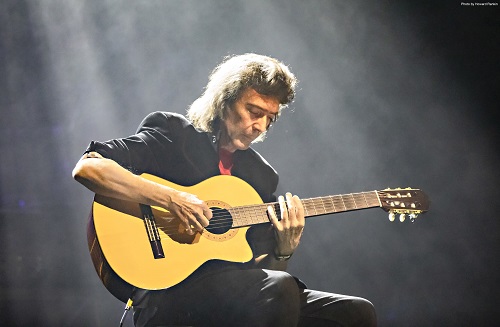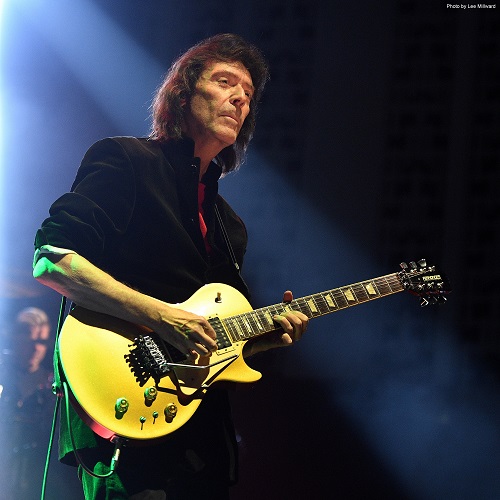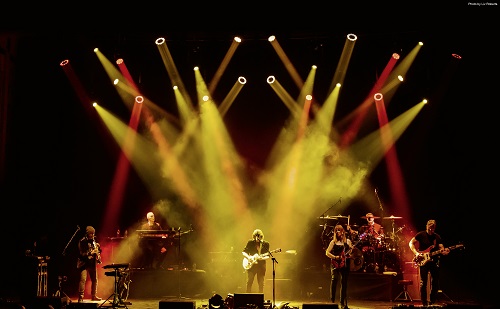By Shawn Perry
Guitarist Steve Hackett is a whirlwind of activity. When he’s not touring, he’s recording new music, or interacting with fans online. At 72, retirement for Hackett isn’t even up for consideration. As he would remind me during our conversation, life is too short to sit back and do nothing. His credo is to continue to play music, old and new, for as long as he possibly can. So that’s what he does.
In 2021, when touring wasn’t in the cards, he released two solo albums, Under A Mediterranean Sky and Surrender Of Silence. For the better part of the last 20 years or so, he’s been playing out live, offering not only his own solo music, but much of the music he made as a member of Genesis. In addition to the two albums he made covering various Genesis songs with guest singers, he and his sensational band — keyboardist Roger King, multi-instrumentalist Rob Townsend, singer Nad Sylvan, bassist Jonas Reingold, and drummer Craig Blundell — have performed entire Genesis albums in concert.
For 2023, it’s all about 1972’s Foxtrot, the second Genesis album Hackett played on. To celebrate its 50th anniversary, the live Foxtrot at Fifty + Hackett Highlights: Live In Brighton was released in September as a double CD with two DVDs or a Blu-ray Disc. His 2023 North America tour behind the release opened October 3rd in Montreal. It was two days prior that we had the following discussion, covering highlights of Foxtrot, how he coped during the pandemic lockdown, what he has in store for 2024, and if he keeps tabs on his peers, as well as his bandmates from Genesis. During our 30-minute interview, Hackett’s work ethic and dedication to his craft shined through with flying colors. If he has his way, the music he’s made on his own and that of Genesis will be celebrated in one form or another for generations to come.
~
You’re celebrating the 50th anniversary of Foxtrot with a new live album and tour. I don’t think I’m exaggerating when I say that this was a very pivotal album for Genesis and you, especially. Looking back at that time in the 70s, it seems like Nursery Cryme was sort of your initiation into the group while Foxtrot saw you exerting your strengths as a songwriter and a guitarist. Watching the interviews behind the 2008 Genesis remixes, everyone was saying the band was feeling very confident at that time. Is that how you remember it?
I can’t account for what anyone else says. I knew that we’d taken a chance on something that was experimental because when we did “Supper’s Ready,” we really didn’t know if there was going to be the kind of response that any kind of extremist act was going to have. I seem to remember a more cautious tone amongst everybody. Pretty much the same as when the Beatles had just done Sgt. Pepper. I read an interview where you could tell they were very nervous. They didn’t know whether having taken that risk on long form and character portraits, whether the public were ready for something that was ritual based. That storyteller aspect — they’d backed that horse.
I think for us, I remember talking to the band and having seen King Crimson do something in their live set before they did In The Court Of The Crimson King, while they were still a band in development and before I befriended them, they had decided to stick a whole bunch of things together just in case people didn’t clap. In other words, they were going do that with no guarantee of applause and onwards on and off. I thought if we took that approach with Genesis, because I thought it could work, we could do a long-form piece, but it had to have all the bells and whistles going for it. I knew we had to have a light show, knew we needed a Mellotron. Thus far, we borrowed from Crimson in terms of presentation. But in terms of content, the music was entirely different. And I think that something that, that could have been 15 minutes or so developed into 23 odd minutes.
I was very pleased that it was well received. But Peter Gabriel and I put our foot down with the rest of the guys and said, “There’s no point doing this unless it’s got all the bells and whistles. It needs the light show. It’s going to need everything that Pete can throw at it as a lead vocalist. And it needs all the sound effects. It needs to be weird and wonderful in order to not just engage their interest but sustain it.” Audiences seem to be enraptured by it, and the record company liked it instead of tearing up our contracts. So, we were on our way.
This kind of thing about success and failure, you know, it hangs by a knife. But instead it paid off because you’ve got an album that’s got the broadest base of all the writing from science fiction to early music, social comments, humoresque, all of that. It was not straight ahead. It wasn’t bluesy, so I think for America, it was baffling for them initially. That was if we could get a gig, and that was tricky.
I find it interesting what the other guys say about it. They either dismissed it and said, “Yes, we did this when we were students, didn’t know what we were thinking about.” But then I think they may have revised their opinion as it’s become the most popular progressive track of all time. I believed in it then, sweated blood for it then, and I’m prepared to do the same for it now. I love it. There are other things on it, of course, but yes Foxtrot — it was a pivotal album.
Yes, there were other things on it, namely a song you wrote called “Horizons.” I was tracking through the 5.1 surround DVD, and I landed on “Horizons.” I’m just thinking to myself — you were only what? 21, 22 years old when you wrote and recorded this piece?
That’s right.
It sort of serves as a prelude to “Supper’s Ready,” and it was based on a Bach progression?
Pretty much. It had the brevity of stuff from the Tudor period and the kind of style of Bach’s “Cello Suite No.1.” I wasn’t expecting that the band would want to record it, but they heard me playing it and thought it sounded good. And it got used on the album, which kind of functions as a starter for “Supper’s Ready,” a kind of hor d’oeuvre before the main course.
I perform the whole album in its entirety now, which we didn’t do back in the day. I’d written “Can-Utility And The Coastliners,” and the band didn’t really want to do that. That one was kind of forgotten until it got unearthed a few years back when Steven Wilson said it was his favorite track on that album. I said, “Would you like to sing it?” So we recorded the version with him. It’s very good live. It’s got some great sections in it, which are mainly classical, right until the end where you get something more syncopated. But I love the Mellotron section, which is kind of folk music in a way, guitars, jazz drumming and a classical style string part writing on the top. It’s one of my favorite Genesis bits ever.
I would say there were two favorite Genesis albums I could be passionate about this. I think if you took them in, in their entirety, Foxtrot and Selling England By The Pound are the two best Genesis albums. That’s how I see it. And I’ve noticed that people I’ve been talking to say the same thing because I’ve been doing a lot of research on this. I’ve done a fair amount of interviews about this. John Lennon made a comment or two. He apparently said that he considered Genesis to be the true sons of the Beatles, which I think is the highest accolade Genesis ever got from that early period. According to Nigel Pierce, who says he’s got a tape of this and is a DJ in Norfolk, England, says that Lennon used to get everything from Nursery Cryme onwards sent over to him in New York. Had I but known, I would’ve loved to have shaken his hand.
I’ve heard he was a bit of a prog fan. You’ve been in this rhythm of mixing your solo material with these classic Genesis albums. I find it interesting that with everybody in Genesis still alive, you’re really the only one who’s playing this music. I know Peter Gabriel’s out on the road, but he doesn’t play Genesis music at all. So you’re kind of the keeper of the flame. Why do you think that is?
It’s funny, isn’t it? Someone was saying to me — and this is the second time I’ve heard this from somebody in the industry — that apparently, he’d asked his band to play “Supper’s Ready,” and they said they weren’t prepared to, it was too difficult. There’s no distinction as far as I’m concerned. I’ll play stuff that was Genesis then, and I’ll play stuff that’s me now, or me then. It’s all just a continuum. I was interested in it then; I’m interested in it now. I think the approach is right. The idea of long-form musical continuum has intrigued me ever since I heard of the Beatles heading that way.
It is the thing that whatever turns on listeners is precisely the thing that turned off DJs — the idea that they didn’t know when something was going to start and stop. And I remember saying, “I hate that because blah, blah, blah, blah, blah, blah.” I think it’s the safety and numbers approach whereby you didn’t like that tune. Well, it very quickly goes into another one and another one and another one. And so you don’t have time to think on first listening that, “Oh, I didn’t like the first one or the third one, but I like the fourth and the fifth one.”
So music that keeps going, the kind of the audio equivalent of the rolling show is what I’m all about. And maybe it rolls in the way that that film does, film for the ear rather than eye to create images from the stories that are being told. Or maybe it’s just the music — the atmosphere of things that sound strange at first, perhaps, but over time become familiar and become accepted. Something that may be a little abrasive at first can often be embraced in a way that maybe if it comes in sweet from the word “go”… there’s not enough intrigue here, not enough drama perhaps. So if you hear something that’s abrasive, you could ask yourself, “Why am I slightly uncomfortable with this?” It’s leading to resolution, tension and release and dynamics — from hearing a pin drop to a roar. The quality of surprise is, I suspect, what interests people in progressive stuff rather than separate tunes.

Next year will be the 50th anniversary of The Lamb Lies Down On Broadway.
Indeed.
Any thoughts on taking that one out and running through it?
I was thinking that I am probably going to do maybe about five selections from it. I’m not going to do the whole thing because I realize that deserves to be celebrated, but it’s also divisive. Not everyone is as thrilled with that as they were with its predecessors. And I also want to have time to do some solo stuff. In my mind, I’m still putting together that set list. But there are moments of The Lamb that I think are great music. To do it in its entirety, I think you need quite a lot to put that across, to update those visuals, depersonalize it in order to reinvent it. Can we have the avatars here, the dancing girls in the wings, the lasers, the screens, and all the rest? I think, well…yes, you could. I’m not sure that it’s worth doing the bank raid in order to do that.
The last time we tried to, as a band with Genesis, bring that back in front of the public was 2005. What was on the table was the idea of it potentially becoming a musical as well as us doing a few gigs. And that really got shot down in flames at the first meeting. I think people remain divided. Is it too complicated for a musical? Would it have the same effect? Can you change the game with musicals? Because a lot of things have been adapted. I don’t know. The juries out on that one. You do need everyone’s cooperation to do that. With all the people that wrote it, the power of veto remains with everybody, with all five. One objection, and suddenly a Mexican stand-off and all that.
Let’s switch gears. You recall a couple years ago when everyone had stopped touring due to the pandemic. Like some people, you took advantage of that downtime and recorded two albums — Under A Mediterranean Sky and Surrender Of Silence. You had this time and space to be creative and make new music. At the same time, you’re out on the road a lot. Where was your head at that time?
We were halfway through an American tour. We were due to tour for about a month and we were two weeks in, and then everything closed down. The country literally closed down. We managed to get the last flight back from Philadelphia. We felt like fleeing refugees in that we just made it. There was a frustration about not being able to deliver to people. So many shows that were due to happen. It was a three-year catch-up period. There were orchestral shows with a German orchestra. We managed to do those. But at the time, I thought, perhaps I can stay in touch with people in another way. Certainly, I can be productive in terms of recording.”
I did lockdown videos. My wife Jo filmed me talking to people, sometimes playing live to the camera with just a guitar, other times talking about forthcoming stuff. Teasers, saying, “I’m proud of this one, see if you’re like this.” it really seemed to work. I was talking about current and future stuff, and also talking to people about previous things, both Genesis and solo things, inviting fans to ask questions. I would try and get back to them, talk pretty much as we’re talking now, but to the camera. So that was a way of staying in touch with people. Pretty much on a daily basis at one point. If I couldn’t be with people in one way, I could be with them in another sense. And it meant that those albums were very well received.
They did very well charted, which was great. I managed to finish off my book. I’ve been working on that for 15 years. I’ve got an autobiography out, so we made productive use of that time. If you couldn’t do one thing, you could do something else. It’s nice to be able to adapt. No one would really want to go through that time again. But I noticed that people went one of two ways. They either decided to get going in another way, like we did, or they were just too depressed, and couldn’t do anything.
I don’t seem to thrive on that. I’m from the other school of approach. I also feel that the clock is ticking for all of us. I think life’s too short for just sitting back. That idea didn’t really appeal to me. I guess it was a way of keeping fit. I won’t get exhausted on tour — part and parcel of being on tour, that’s what everyone does, you know? How do you sleep in strange beds? (Laughs) And at all stages of your life, either as a young guy, you’re falling over and getting up with hangovers every day, or you’re not quite doing that because you have to reign it in. I have to say it was a frustrating but fulfilling time in equal measure.

I imagine you’re always writing as well. Is another solo album in the works?
It’s actually done. We’ve given the record company all the parts, including a 5.1 mix, surround and stereo and artwork and lyrics and all sorts of stuff. We had to deliver that to them before we were setting off for this two-month tour. So the announcement will happen at the end of this tour, sometime around December for an album that’ll be out around mid-February.
Fantastic.
The Foxtrot one has gone to number two in the rock charts in the UK, which is great. I think we’re making headway with the metal charts and rock charts, which is great for stuff that’s vintage.
Over the summer, you participated in a tribute concert for John Wetton. Tell me about your relationship with him.
We were friends. We used to show up on each other’s things. John was much loved in the industry. It was a shock when he passed. We knew he wasn’t well, but it didn’t make it any easier. We loved him, and I was so happy to take part in that for him. Sometimes I’d show up with him or he with me. He’d talk me into doing “All Along The Watchtower.” Whoever was playing guitar in his band, we would swap solos with that. That’s something that we did at this tribute. There were many people who took part in it. It was a small place, but it was live streamed to a much wider audience. I remember when it started up, it was hugely loud in this small place, and I thought, “Wow, we’re off for this ride. We’re going to ride this wave.” It was quite something. I gave it everything.
I’ve done it a couple of times since with various people. I’ve continued that tradition because it’s a guitar-friendly chord sequence. I always get excited about it. Sometimes, in rehearsal, it just takes off and goes absolutely nuts. We did it on Cruise To The Edge with both John Wetton and Chris Squire, both of whom have passed. Both were great friends who’ve passed, and there is film of that. Nick Beggs is up there, too. Phil Collins’ son, Simon, guys in my band. It’s a party piece, I guess.
Regarding some other people that you know and have worked with, do you follow other’s activities? Do you follow what’s going on with Yes, For example. I know you and Steve Howe worked together. Do you follow them? You mentioned Steven Wilson…are you following him?
Yeah, there’s all sorts of stuff going on. Sean Lennon is following me. Maybe it’s because of the kind things I said about his father. I’m following Julian (Lennon), funny enough. I think Geoff Downes and I follow each other. There’s tons of connections with tons of people, some of whom I’ve worked with, many of whom I’ve yet to work with. I find it very interesting. All of that is social media and putting people in touch.
Perhaps when we all shuffle off this mortal coil, there’ll be more communication, if you believe in the powers of the spirit. I suspect the similarities between people are more numerous than the difference. We’re all here for a short while. It’s not enough time. One lifetime’s not enough, certainly not enough in music.
Are you still in touch with the guys from Genesis?
Yeah, from time to time. The last one I spoke to was Peter Gabriel roundabout our birthday time, which we share.
Aren’t you two a day apart?
Right. Same birthday. We are a day apart. I think he’s the last I spoke to. Before that, Phil. Sometimes we show up at functions. If somebody releases a book, there’s normally a contingent that will show up, back it up, and what have you. I met with them when Mike released his book, and Tony was there. Tony said, “You’re keeping the legacy alive.” I imagined that he might be a critical of my attempts to keep that going. It is keeping not just the legacy. These are great tunes, and I hope they survive beyond my humble efforts to keep them out there.
I know a full-blown reunion is pretty much out of the question, given Phil Collins’ health issues. Do you foresee any time in the future where you would collaborate with one of your former bandmates?
Yeah. I think that collaboration is more important than competition at this point. Let’s face it: We’re all in the same boat and of a certain age. My only problem now is that I have to make another call literally at this point. But wouldn’t it be nice, as the Beach Boys said. (Laughs)





















